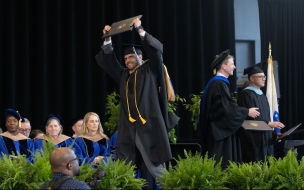She enrolled in Lancaster University School of Management in October last year, after a year managing at The Dairy Farm Group, the Asian retail giant operating 6,000 outlets.
Before that, she was a legal associate at Kadir, Andri & Partners, a leading Malaysian law firm specializing in banking and finance, where she worked on Malaysia’s largest IPO.
Why did you decide to begin an MBA degree?
Pursuing an MBA has always been one of my goals. One of my dreams is becoming a respectable corporate figure. My career path has always been geared towards achieving this.
I decided that it was time to begin the MBA at this stage of my career, as I knew that if I had the business acumen and management skills to complement my knowledge in law, I would be able accelerate my progress in the corporate world.
What was your greatest challenge switching from the legal profession to business/management?
There are many parallels between legal work and business management and, having practised as a corporate and commercial lawyer, I did not find the switch difficult.
However, sometimes my legal acumen may creep up and take over in class — so much so that the professors could easily identify my previous background.
Balancing both aspects and learning which tools I should use in making decisions is something that I have been learning to do.
What made your business school stand out from the rest?
After reviewing many MBA prospectuses and visiting MBA fairs, I was drawn to the uniqueness, quality and proven track record of the Lancaster MBA. Its structure demonstrates that it can be tailored to individuals.
It provides the opportunity for many practical “learning through action” experiences, helping you to become a strategic and mindful leader, and emphasis is placed on the personal and professional development of each student.
There are also many opportunities to network in two of the largest business hubs in the UK, as some parts of the program are conducted in London and students have to work with corporations in Manchester.
How would you describe the culture at your business school?
The MBA 2014/15 cohort consists of 17 different nationalities from various professional backgrounds, such as medical, legal, sales and accountancy. The learning environment and culture is definitely one that is very collaborative, where the sharing of knowledge is immense.
Due to its size, the class is also a very close-knit group, and is supportive of each other’s development.
Which aspect of the MBA has been the most valuable?
I cannot pinpoint a single aspect of the MBA that I would say is most valuable, as I have indeed developed my professional and personal character, skills and competencies tremendously in the last nine months. However, there are a number aspects that have been very beneficial, such as:
The networking and career development opportunities in London and in the North [of England] that are provided by our very supportive career development team;
The “real life” business challenges to put into practice the theoretical knowledge acquired, such as the opportunity to consult with UK’s largest Chamber of Commerce to develop a strategy for its research and analytics function;
The opportunity to learn from people all over the world and build lasting friendships through the numerous team exercises.
What advice would you give to people who are about to apply to business school?
The MBA is a very intensive, challenging and exhilarating program. You always have to bring your “A” game. There are periods where we have practically no sleep. And there is definitely no way one can be a free rider and cruise his or her way through the course.
People who are thinking of applying to any top-ranked business school have to be very sure that they are able to commit the next 12 months of their lives to a lot of hard work, and always keep sight of their goals and objectives.
There are also many opportunities to have fun, network and build lasting friendships. So, ensure that every opportunity to do so is fully utilized.
What are your future career plans?
I would like to use my legal and MBA knowledge to help companies and/or legal firms develop their business strategy, find their strategic capabilities, facilitate [business] between the Eastern and the Western markets, and achieve competitive advantage.
Organizations are now very keen to recruit people who not only possess general business knowledge but also a specific skill-set. Having practised as a lawyer, I would be able to contribute my legal knowledge and analytical skills, and, with the experiences I have working with one of Asia’s biggest retailers coupled with the MBA, I not only have knowledge of projects but also the day-to-day operations of a business.
Student Reviews
Lancaster University Management School
RECAPTHA :
b7
ed
d8
28








